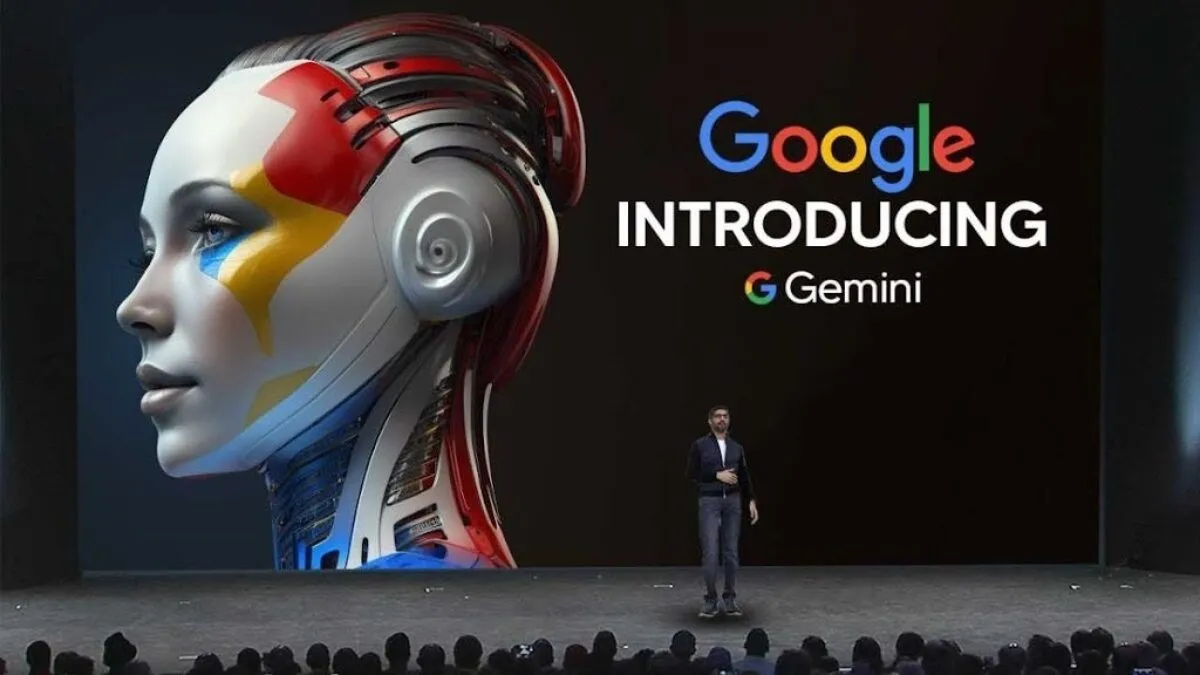Google has officially thrown down the gauntlet in the generative artificial intelligence (AI) market with the launch of Gemini, marking a significant milestone in the company’s AI development journey. This cutting-edge suite of AI models represents Google’s response to the rapidly evolving landscape of generative AI, dominated by breakthroughs like OpenAI’s ChatGPT. Gemini’s introduction is not just an enhancement of Google’s AI capabilities but a declaration of its intent to lead in the generative AI space.
Key Highlights:
- Introduction of Gemini: Google’s latest and most advanced generative AI model, designed to outperform existing technologies in multimodal language understanding.
- Three Variants for Diverse Applications: Gemini is available in three versions – Ultra, Pro, and Nano – catering to a range of computational needs from high-powered data centers to mobile devices.
- Integration Across Google’s Ecosystem: Gemini is being integrated into a wide array of Google’s products, including Android and iOS apps, promising to revolutionize user interactions with voice, image, and text.
- Safety and Accessibility: Google emphasizes the safety of its Gemini products, incorporating measures like watermarking to mitigate misuse, alongside efforts to ensure the AI’s broad availability.

With its launch, Google aims to capture a significant share of the generative AI market, leveraging Gemini’s unparalleled capabilities in understanding and generating human-like responses across various data formats. Alphabet-owned Google’s strategic move with Gemini underscores its ambition to not just participate but dominate the generative AI space, challenging competitors and setting new standards for AI-driven innovation.
Gemini: A Closer Look at Google’s AI Powerhouse
Gemini distinguishes itself by being the first AI model to surpass human experts in Massive Multitask Language Understanding (MMLU), showcasing its superior problem-solving abilities and versatility across different data types. Developed by Google DeepMind, Gemini represents a culmination of years of research in machine learning, neuroscience, and computational science, aiming to create an AI that is not just technologically advanced but also intuitive and useful.
The introduction of Gemini comes at a time when the generative AI market is witnessing unprecedented growth, with investments surging and companies like Microsoft-backed OpenAI and Amazon Web Services launching their own AI tools. Google’s approach with Gemini, however, is notable for its integration into the company’s vast ecosystem, promising to enhance a wide array of services from search and ads to mobile applications.
A New Era of AI Accessibility and Integration
Gemini’s rollout is accompanied by various accessibility options, including a free web version through the revamped Bard (now Gemini) and a mobile app for both Android and iOS platforms. Additionally, Google has announced Gemini Advanced, a subscription-based service providing access to the model’s full capabilities, including integration with Google Workspace applications. This strategic move not only broadens the accessibility of Gemini’s advanced AI capabilities but also positions Google competitively against other paid AI services.
The Broader Implications of Gemini’s Launch
Google’s launch of Gemini represents a pivotal moment in the generative AI landscape, signaling a shift towards more integrated, versatile, and accessible AI technologies. By embedding Gemini across its product range, Google not only enhances the functionality and user experience of its services but also sets a new benchmark for the application of generative AI in everyday technology.
As we look forward, the implications of Gemini’s introduction extend beyond technological advancements to encompass regulatory, ethical, and societal dimensions. With the EU’s AI Act on the horizon, Google’s careful navigation of regulatory landscapes underscores the complex interplay between innovation, policy, and market dynamics in the age of AI.
In Conclusion
The introduction of Gemini marks a significant leap forward for Google in the generative AI race, underscoring its commitment to innovation and user-centric technology. With its advanced capabilities, wide-ranging applications, and strategic integration into Google’s ecosystem, Gemini is poised to redefine the boundaries of what AI can achieve. As the technology evolves and becomes more integrated into our digital lives, the true potential of Gemini, and generative AI at large, will unfold in exciting and unpredictable ways, shaping the future of digital interaction and AI application.




























